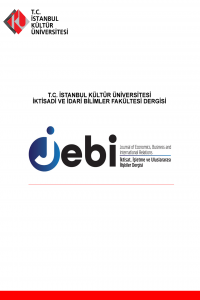DİJİTALLEŞMENİN İŞ GÜCÜ PİYASALARINA ETKİSİ: AVRUPA BİRLİĞİ ÜZERİNE DİNAMİK PANEL VERİ ANALİZİ
Sanayi devrimlerinin beraberinde getirdiği teknolojik gelişmeler ekonomik ve sosyal hayat üzerinde önemli etkiler yaratmıştır. Dijitalleşmenin ivme unsuru olarak kabul edilen dördüncü sanayi devrimi teknolojilerinin, günümüzde kullanım alanlarının genişlemesinden iş gücü piyasası da etkilenmektedir. Bu çalışmada; dijitalleşme ve dijital dönüşüm kavramları özetlendikten sonra iş gücü piyasalarına ilişkin teoriler incelenmiştir. Analiz bölümünde ise; Avrupa Birliği ülkelerinin 2002-2018 yılları arasındaki istihdam oranları Rutin Yoğunluk Endeksi’ne göre bilişsel, manuel ve rutin olarak gruplandırılarak analizin üç ayrı bağımlı değişkeni oluşturulmuştur. Avrupa Birliği’nin bilişsel, manuel, rutin istihdam oranları ile dijitalleşme arasındaki ilişki üç ayrı model üzerinden ayrı ayrı incelenmiştir. Sistem GMM tahmincisi ile çözümlenen panel veri analiz sonucunda dijitalleşmenin iş gücüne etkisinin bilişsel istihdam oranını arttırıp, rutin istihdam oranını azalttığı gözlemlenmiştir
Anahtar Kelimeler:
: Dijitalleşme, İş Gücü, Avrupa Birliği
THE EFFECTS OF DIGITALIZATION ON LABOR MARKETS: DYNAMIC PANEL DATA ANALYSIS ON EUROPEAN UNION
Technological developments brought by industrial revolutions have created significant effects on economic and social life. Technologies of the fourth industrial revolution, which is regarded as the accelerator of digitalization, also affect the work market through the expansion of their places of use. This study summarizes the concepts of digitalization and digital transformation before analyzing theories related to labor markets. Three different dependent variables of the analysis are formed in the analysis section after the employment rates of the European Union countries between 2002-2018 are grouped as cognitive, manual, and routine according to the Routine Intensity Index. The relationship between digitalization and European Union’s cognitive, manual, and routine employment rates is analyzed through three different models. As a result of the panel data analysis conducted by the System GMM estimator, it is observed that the effect of digitalization on labor increases cognitive employment rate, whereas it reduces the routine one.
Keywords:
: Dijitalleşme, İş Gücü, Avrupa Birliği,
___
- Autor, D. H., Levy, F., & Murnane, R. J. (2003). The skill content of recent technological change: An empirical exploration. The Quarterly journal of economics, 118(4), 1279-1333.
- Autor, D., Katz, L. F., & Kearney, M. (2006, May). Measuring and interpreting trends in economic inequality. In AEA Papers and Proceedings (Vol. 96, No. 2, pp. 189-194).
- Autor, D. H., Katz, L. F., & Krueger, A. B. (1998). Computing inequality: have computers changed the labor market?. The Quarterly journal of economics, 113(4), 1169-1213.
- Acılıoğlu, İ., & Kaya, N. N. (2021). Beyaz Yakalının Dijital Yakalıya Dönüşümü.
- Aksu, H. (2019). Dijitopya: Dijital Dönüşüm Yolculuk Rehberi. Pusula.
- Alçin, S. (2016). Üretim için yeni bir izlek: Sanayi 4.0. Journal of life Economics, 3(2), 19-30.
- Arslan Olcay, C&Genç, Ö. (2021). Dijital Ekonomi: Kavram, Tanım Ve Ölçümü Üzerine Bir Değerlendirme. International Social Mentality and Researcher Thinkers Journal, (Issn:2630-631X) 7(49), 2238-2247.
- Anderson, T. W., & Hsiao, C. (1982). Formulation and estimation of dynamic models using panel data. Journal of econometrics, 18(1), 47-82.
- Arellano, M., & Bond, S. (1991). Some tests of specification for panel data: Monte Carlo evidence and an application to employment equations. The review of economic studies, 58(2), 277-297.
- Arellano, M., & Bover, O. (1995). Another look at the instrumental variable estimation of error-components models. Journal of econometrics, 68(1), 29-51.
- Baltagi, B. H., & Baltagi, B. H. (2008). Econometric analysis of panel data (Vol. 4). Chichester: John Wiley & Sons.
- Bulut, E., & AKÇACI, T. (2017). Endüstri 4.0 ve inovasyon göstergeleri kapsaminda türkiye analizi. ASSAM Uluslararası Hakemli Dergi, 4(7), 55-77.
- Büyükuslu, A. R. (2018). Dijital dönüşüm. Basım, İstanbul: Der Yayınları, 51.
- Blundell, R., & Bond, S. (1998). Initial conditions and moment restrictions in dynamic panel data models. Journal of econometrics, 87(1), 115-143.
- Breau, S., Kogler, D. F., & Bolton, K. C. (2014). On the Relationship between Innovation and Wage Inequality: New Evidence from C anadian Cities. Economic Geography, 90(4), 351-373.
- Çelik, N. (2008). Beceri Yanlı Teknolojik Değişme Yaklaşımı ve Gelişmiş Ülkelerde İşgücü Talebi. Bilim, Eğitim ve Düşünce Dergisi, 8(3).
- Demir, C. (2019). Endüstri 4.0: Yakın Geleceğin Sanayi Devrimleri. Editörler: Burcu Türkcan, Utku Akseki). Endüstri, 4, 59-80.
- EROL, S. İ. İŞGÜCÜ PİYASALARININ DEĞİŞEN YAPISI VE SORUNLARI. Yüzüncü Yıl Üniversitesi İktisadi ve İdari Bilimler Fakültesi Dergisi, (2), 34-56.
- Goos, M., Manning, A., & Salomons, A. (2014). Explaining job polarization: Routine-biased technological change and offshoring. American economic review, 104(8), 2509-26.
- Greene, W. H. (2012). Econometric analysis. Harlow.
- Goldin, C., & Katz, L. F. (2007). The race between education and technology: the evolution of US educational wage differentials, 1890 to 2005.
- Hausman, J. A., & Taylor, W. E. (1981). Panel data and unobservable individual effects. Econometrica: Journal of the Econometric society, 1377-1398.
- Kim, Y., & Thompson, E. (2021). Routine-Biased Technological Change and Declining Employment Rate of Immigrants. Eastern Economic Journal, 47(3), 319-353.
- Patel, K., & McCarthy, M. P. (2000). Digital transformation: the essentials of e-business leadership. McGraw-Hill Professional.
- Griliches, C. S. C., & Complementarity, C. S. (1969). Review of Economics and Statistics, 51 (4).
- Sıla, G. E. N. Ç. (2018). Sanayi 4.0 Yolunda Türkiye. Sosyoekonomi, 26(36), 235-243.
- Spitz-Oener, A. (2006). Technical change, job tasks, and rising educational demands: Looking outside the wage structure. Journal of labor economics, 24(2), 235-270.
- Yerdelen Tatoglu, F. (2018). İleri panel veri analizi. Stata Uygulamali (Advanced Panel Data Analysis). 3rd edition, Istanbul, Beta Yayincilik.
- World Economic Forum 2016 The Future of jobs: Employment, Skills and Workforce Strategy for the Fourth Industrial Revolution, pp. 3, http://www3.weforum.org/docs/WEF_Future_of_Jobs.pdf Erişim Tarihi: 20.05.2020
- Windmeijer, F. (2005). A finite sample correction for the variance of linear efficient two-step GMM estimators. Journal of econometrics, 126(1), 25-51.
- Wang, J., Hu, Y., & Zhang, Z. (2021). Skill-biased technological change and labor market polarization in China. Economic Modelling, 100, 105507.
- Başlangıç: 2022
- Yayıncı: İstanbul Kültür Üniversitesi
